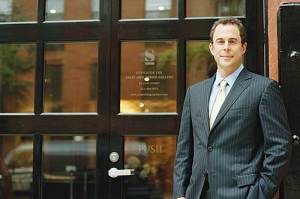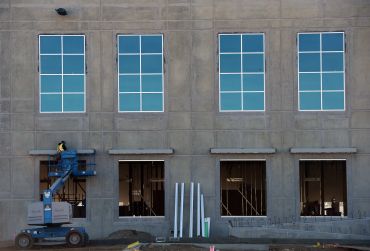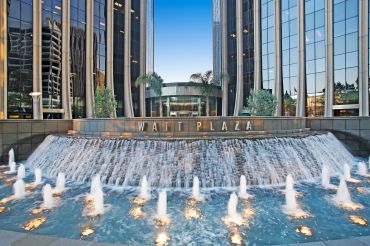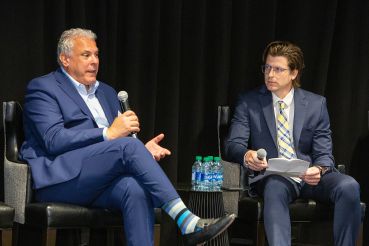New Directions: Jeff Blau on Developing the West Side Yard and Expanding in the Middle East
By Jotham Sederstrom June 8, 2010 2:56 pm
reprints Related Companies president Jeff Blau on developing the West Side Yard and expanding in the Middle East
Related Companies president Jeff Blau on developing the West Side Yard and expanding in the Middle East
The Commercial Observer: What’s the latest on the West Side Yard project?
Mr. Blau: The timing’s perfect for that question. We last week signed a contract with the M.T.A., which is the first step in the process. That contract was changed a little bit and provided some triggers as to when we would have to close with the M.T.A., but in the meantime, it allows us to really get started working on the development and talking to potential tenants coming to the project. So we signed the contract and we formed a new joint venture with OMERS, which is the Ontario Municipal Employees Retirement System, through their affiliate, called the Oxford Properties Group. So together we will be the joint venture partners and developers of the entire project.
When do you expect to begin construction?
That’s the big question. Obviously the markets have just gone through a pretty significant shock and nobody has a crystal ball to know exactly when to start, but we are seeing tremendous interest from large office users and retailers for state-of-the-art, green, high-tech, built-to-suit space. Although the vacancy rate might be higher than historical norms, if you look at spaces available for large tenants that have all the modern amenities and green requirements, there’s not that many options.
In general, it looks like Related has grown fairly confident with the idea of beginning new development projects. Why is that, especially right now?
We have a lot going on, but we have not started a lot of new things in the past 12 months. We are now opportunistically looking at land and development sites and starting to think about the future, but I don’t think the market is quite ready, this year, for new construction starts. I also don’t think the construction lending markets are buying debt. But we’re starting to see a glimmer of light, and market dynamics are starting to head back to equilibrium and we’re hopeful that in the near future we will be able to start again.
We last week signed a contract with the M.T.A., which is the first step in the process. It allows us to really get started working on the development and talking to potential tenants coming to the project.
Between commercial and residential, which is a safer investment right now?
In New York we’ve always been firm believers in the residential space, so that’s where our focus is. We have done built-to-suits for large office users. So, again, to the extent that you can deliver a product that doesn’t exist in the market, we like built-to-suit. But beyond that, we really focus on residential.
Related just opened a few new offices, including outposts in Abu Dhabi and Shanghai. What’s your outlook for the Middle East?
When the market really turned down here, we had all this real estate talent and expertise and resources here, and we were looking to keep the team together and active and see where we could utilize those resources. We looked outside the United States to other places that were still growing, and that’s what led us to the Middle East and China. We have two of the sovereigns from the Middle East-Kuwait and Abu Dhabi-as partners in our company, and they helped us find partners from the Middle East, and we’re working with them now for venture development. It’s a way to really expand our capabilities when development has slowed here in the states.
Are there any cultural challenges that come with expanding to the Middle East or China?
I mean, in China, not everyone speaks English. In the Middle East, it’s a little bit easier because everybody does. But obviously the development has to reflect local traditions and customs, and it’s very important for the most part that you have local partners when you’re doing development in countries like that so you don’t make a mistake. There are certain cultural traditions and elements that are required in those areas.
Outside of the Related Company, you and your partners-Stephen Ross and Bruce Beal Jr.-have plans to acquire a commercial banking institution from the F.D.I.C. Can you share some of the details?
When the markets were down and we knew that development wasn’t going to be so busy, we really saw the opportunity to move into different areas where we could capitalize on our real estate expertise but not directly into development, for that period of time. We set up a series of funds and really created a fund management platform here. So we created a core asset fund and a construction loan fund and really where we saw one additional opportunity was to be a lender as opposed to just being involved on the equity side of real estate. And the best way to capitalize in the lending business is through costs of deposits, so we started investigating the possibility of purchasing an F.D.I.C.-insured depository bank in the United States, and we spent the past two years getting ourselves through the regulatory process to get approved and now, today, we have our charter and F.D.I.C. insurance. Right now, we’re really looking to work with the F.D.I.C. to acquire an institution.
Skechers recently leased some space at the long-awaited Gateway Center in the South Bronx. How is business going there? Is it nearly leased up?
I couldn’t tell you the exact percentage, but I think we’re about 92 percent leased right now, and the stores are having phenomenal success in their sales. So we consider that a tremendous success in this market. The balance of the space will be leased over time as more retailers learn about us and the existing retailers talk about the success they’re having in sales.
On a lighter note, any good plans for the summer, or just busy working?
We’re busy working.
jsederstrom@observer.com


